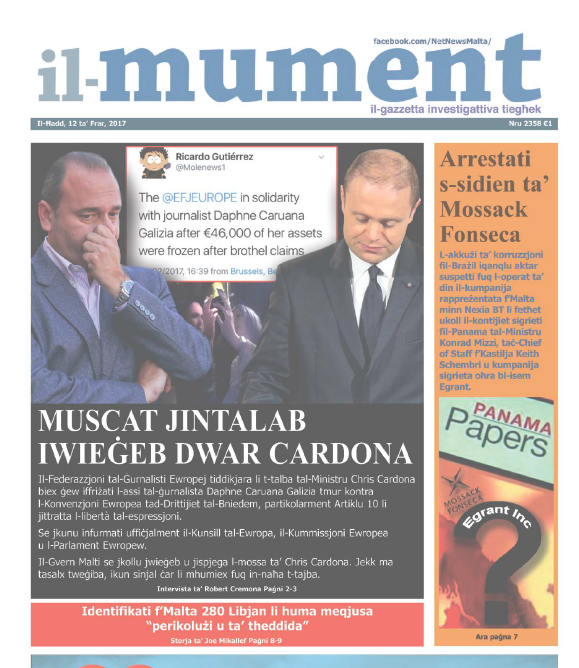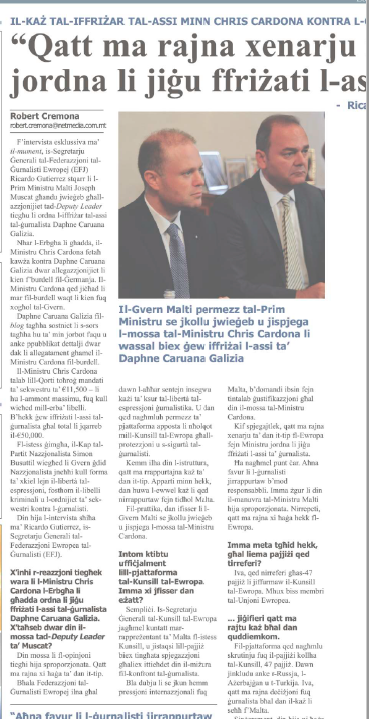European Federation of Journalists says Council of Europe, European Commission and European Parliament to be formally notified of Minister’s ‘asset freeze’ action against journalist/ “We have never seen anything of this kind in Europe”
The interview below is translated from the Maltese.
———
In an exclusive interview with Robert Cremona for Il-Mument, the Secretary-General of the European Federation of Journalists (EFJ) Ricardo Gutierrez, said that Malta’s Prime Minister Joseph Muscat has to answer for the actions of his deputy leader who ordered the freezing of assets belonging to the journalist Daphne Caruana Galizia.
How did you react when, last Wednesday, Minister Chris Cardona froze journalist Daphne Caruana Galizia’s assets? What do you think of this action by Muscat’s deputy leader?
In my opinion, this action is disproportionate. We have never seen anything like this. As the European Federation of Journalists, for the last two years we have followed cases of limitations on journalists’ freedom of expression. We are doing this through a dedicated platform created by the Council of Europe for the protection and safety of journalists.
As long as this structure has existed, we have never reported a case like this. Apart from that, this is the first case we have had from Malta. In practice, this means that the Maltese government will have to answer for and explain Minister Cardona’s action.
You have written formally to the Council of Europe platform. What does this mean, exactly?
Simple. The Secretary-General of the Council of Europe will contact Malta’s representative in the Council and will ask the country to explain why this measure was taken against the journalist. Undoubtedly there will be international pressure on Malta, with hard questions asking for justification for Minister Cardona’s action. As I explained, we have never seen a scenario of this kind in Europe where a minister orders the freezing of a journalist’s assets. Let me make this clear. We are in favour of journalists’ reporting responsibly. However, this manouevre by a minister is disproportionate. I repeat. We have never seen anything of this kind in Europe.
But when you say that, which countries are you referring to?
Yes, we are referring to the 47 countries that form the Council of Europe, not just the members of the European Union.
Meaning you have never had a case like this one?
On the platform, all 47 members of the Council of Europe are scrutinised. These even include Russia, Azerbaijian, and Turkey. Yes, we have never seen a decision about a journalist like this case in Malta. Sincerely, this is very strange. And I cannot understand why the minister has done this. On our part, the European Federation of Journalists is backing Daphne Caruana Galizia. I should also add that we are also preparing official letters to be sent to the European Commission and to the European Parliament. We are going to strongly support our colleague in Malta.
In your opinion, do Minister Cardona’s actions violate fundamental rights?
It is a violation of the standards that we are accustomed to in Europe. And it is against the European Convention on Human Rights, particularly Article 10 which deals with freedom of expression. We unreservedly condemn this kind of interference in the work journalists do.
When you say that government should answer, are you expecting an explanation from the minister? An explanation from the prime minister?
Both should answer. The official correspondence will be sent to the Maltese state. Obviously, there is no obligation to answer. Since 2015 we have reported 254 cases of violation of journalists’ rights. We have received around 100 responses. If you do not respond or refuse to provide clarification about this case, that would indicate that you are in the wrong. It is a violation of the standards that we are accustomed to in Europe. And it is against the European Convention on Human Rights, particularly Article 10 which deals with freedom of expression. We unreservedly condemn this kind of interference in the work journalists do.



